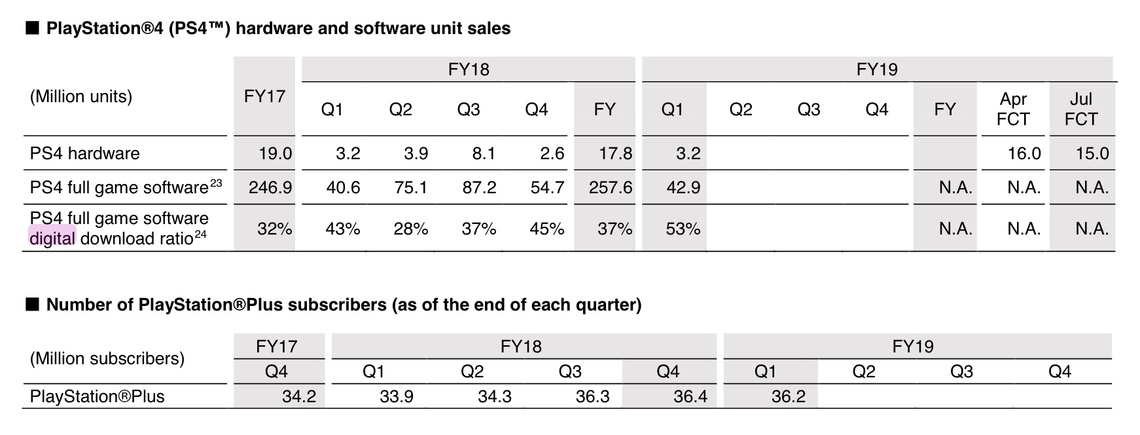PlayStation 4 Digital Game Sales Overtake Physical. That’s a First

Sony's Q1 financial results reveal digital sales of games surpassed those of their physical counterparts for the first time. | Source: Shutterstock
First-quarter financial results released by Sony today reveal that digital sales of PlayStation 4 games surpassed those of their physical counterparts, marking the first time the balance has shifted in the favor of digital content.
Digital downloads on the platform accounted for 53% of full game software sales from the start of the year to June – a 10% jump on figures for the same period last year. For over half of the 42.9 million units sold, consumers opted to download rather than invest in digital copies.

Digital PlayStation 4 games have seen steady growth over the past few years, rising from 32% of total sales in 2017 to 37% last year. The number of subscribers to Sony’s digital PlayStation Plus service also rose from 33.9 million in Q1 2018 to 36.2 million in the same time frame this year.
The report also shows that the PlayStation 4 passed the 100-million-units-shipped milestone, seizing the coveted spot as the fastest console to do so, according to Niko Partners analyst Daniel Ahmad. If there’s any doubt about Sony winning this console generation, then today’s figures put the matter to bed.
Digital Still Has a Ways to Go
The allure of digital content needs no introduction; convenience plays a huge part, taking the need to visit a brick-and-mortar store or order online and wait for delivery out of the picture. Additionally, the ability to pre-download titles in the days leading up to release means players can jump into the action quicker.
The real hurdle to further widespread adoption of digital games is the controversial topic of resale and trade-in functionality. Historically, users are unable to resell or gift games bought on console storefronts held by Sony and Microsoft – except under specific circumstances. A digital equivalent of what dying stores like GameStop have based their entire operation around will need to be ironed out to convert physical media devotees.
Additionally, a homogenization of pricing needs to happen as well. Sony and Microsoft generally price digital copies higher, sometimes upwards of 10% compared to the physical versions – even on launch day titles.
Are Physical Games Dying?
Regardless of the hurdles still marring digital game sales, exclusively cloud-based gaming platforms like Google Stadia and Microsoft’s Project xCloud will stampede onto the gaming market shortly. Whether Sony follows suit remains to be seen, but a partnership with Microsoft to make use of the Azure server network suggests digital content will form part of the Japanese gaming giant’s next-gen strategy.
Apart from Google’s Stadia, details about Microsoft and Sony’s upcoming consoles are limited to speculation and generalized comments about using custom-designed AMD Zen2 Navi APUs and boasting X-amount more graphical processing power than the current crop of consoles.
We don’t exactly know what they will sport under the hood, and although digital will continue to overtake physical media, it’s unlikely the next-generation will be the first to forego a disc drive entirely.
Digital content won’t ever completely kill off physical media but will warp it into a niche product reserved for enthusiasts very much in the same way vinyl records are a collector’s item. A tranche of people will continue to find pleasure in the simple act of carefully pulling the plastic off a new game, catching a whiff of the factory-sealed PlayStation 4 box, and inserting a disc into a console.
More realistic is a tandem of models for each console: one offering a purely digital experience, the other a more powerful device capable of reading physical media. Rumors emanating from the Microsoft camp suggest Project Scarlett already has two models dubbed Lockhart and Anaconda that fit the description.
Speculation aside, the ongoing growth of digital is inevitable, and the next-generation of console signals a cataclysmic shift not just in how consumers play games but how they buy them.